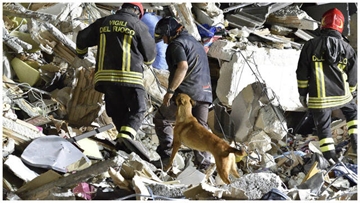A few days ago, I listened, on the radio, an interview with Elier Paz, Executive Director of Canvax Biotech (a Spanish company working on the development of an artificial nose, that can detect cancer).

An artificial nose
This company, with headquarters in Córdoba (southern Spain), is working on a system based on odor detection method.
Elier says that "it is known that a trained dog can smell, breath, urine or stool, cancer with a sensitivity and specificity superior to any other method of diagnosis, existing now. So this it could be a non-invasive method to detect cancer in early stages, and obviously this could have a huge impact in certain cancers, such as lung --in the last 30 years, usually, survival in five years, lung cancer is about 15 percent. However, if these patients are detected, because come to a query, and they do some tests for other ailment that can have, and are detected incipient tumor, lung survival rises to 50 percent to 5 years-- ".
Therefore, with this project, the team of Canvax Biotech aims to replicate the sense of smell of the dog and its ability to detect some kind of odor. Ie, duplicate the nose of a dog, in a lab environment, which allows you to have a diagnostic kit, that can be validated by the authorities, because, although they are doing experimental approaches based on dogs, it is not possible to validate a dog as a detector of cancer, at a practical level. In addition, those who work with dogs know that, for the detection of people –as, recently, it happened in Italy for the earthquake, the dog works for a while, and then rests; that is, it is not possible to have it 8 or 10 hours working--.
Note: I take this opportunity to send a hug to the families of the victims of the earthquake, in Amatrice and other villages around.

A dog searching survivors in Amatrice
According to Elier Paz: "What is clear is that the ability to detect substances through smells, will have an explosion, in the coming years, because it should be an extremely simple method to implement, non-invasive for patients --this is an important thing, because the vast majority of the methods, that currently exist, are of a degree of invasiveness, that a person, who is assumed is healthy, will not do it. Let's say, for you to understand a public, in general, is how to make the ITV (Technical Inspection of Vehicles) to a car, that is, when one takes a car to the ITV, will not repair the car, will ensure that the car is in perfect condition. But, non-invasive methods would be like to make ITV oneself and therefore it should be easily applicable methods, non-invasive, low cost, but also, that they have a sufficiently high detection capability, and this is measured by sensitivity and specificity".
As for the point of the project development, in which they are now, Elier explains that "proteins, which we have in the nose and make as "aerials”, to capture odors, were discovered in 1991, and, so far, it had not been possible to reproduce in the laboratory. We have been the first company worldwide that has managed to reproduce these proteins in the laboratory. Then, giving an example of simile from radio, and we already have a radio, which has appropriate aerials, but now we have to tune it”.
Elier also said that “they are working with several Universities; but, basically, with the Univerisdad of Cordoba; the Maimonides Institute for Biomedical Research, in Córdoba; with Tecnalia, in San Sebastián; and also with a powerful team consisting of clinicians, chemists, biochemists ..., all involved in a goal that is to seek diagnostic methods, that are minimally invasive and are simple and specific”.
So, the interview finished.
I hope that you have liked this spanish project.
Until my next post, kind regards,
Luis.
Sponsored by Costaluz Lawyers.
Please click below:
